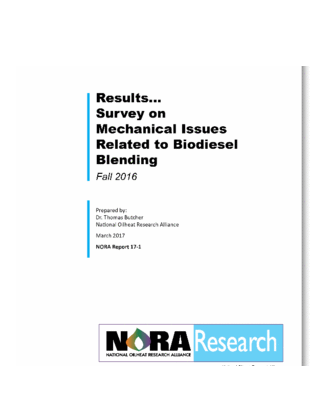Nat'l Oilheat Research Alliance releases biodiesel use survey

April 30, 2017
BY National Oilheat Research Alliance
The National Oilheat Research Alliance has recently released the results of a survey on the usage and potentials benefits and issues associated with the blending of traditional heating oil with renewable biodiesel for home heat use.
Currently, 5 percent biodiesel blends (B5) are being used seamlessly across the oilheat market. Some heating oil fuel marketers are delivering B20 to all of their customers and a few are delivering much higher blends. This blending into the fuel mix in this market leads to concerns about the impact on reliability and service.
Biodiesel is a well-defined standard fuel with quality programs in place. The stability of this fuel has been thoroughly studied. However, it is a relatively new fuel and to evaluate the impact that biodiesel use is having on service requirements, an online survey was completed in 2016.This is an update of a similar study conducted in 2012-’13.
The 2016 use survey was sent to three identified groups, including companies registered as users of the Bioheat (biodiesel blends for heating applications) logo; company owners, presidents and general managers; and service managers. A total of 139 responses were received.
Advertisement
Overall, the responses do not indicate a clear technical area of concern with biodiesel use. Some respondents indicated increased service requirements, but the distribution of the technical areas was similar to those observed in surveys conducted before biodiesel use in this market.
Click here to see the entire report.
Advertisement
Related Stories
Kintetsu World Express Inc. has signed an additional agreement with Hong Kong, China-based Cathay Pacific Airways for the use of sustainable aviation fuel (SAF). The agreement expands a three-year partnership between the two companies.
Broco Energy on July 17 announced a new partnership with the Massachusetts Port Authority (Massport) to deliver and transition Massport's fuel tanks to renewable diesel across its various facilities.
Shell Aviation, Accenture, and Amex GBT on July 10 announced Avelia is in the process of evolving to an industry solution with independent data hosting and a multi-supplier model helping users access the GHG benefits of SAF.
Avia Solutions Group, the world's largest ACMI (aircraft, crew, maintenance, and insurance) provider, has partnered with DHL Express to reduce greenhouse gas emissions from its international shipments using SAF.
Bangkok Airways Public Company Limited has officially announced the adoption of sustainable aviation fuel (SAF) on its commercial flights, reinforcing Thailand’s green aviation industry. The initiative took effect starting July 1, 2025.
Upcoming Events










